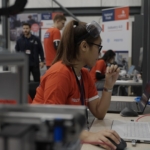This week’s Budget was one focused on ‘the future’. The Chancellor mentioned it in the first line of his statement to the House of Commons and over 20 times thereafter. Whilst all budgets are necessarily forward-looking events, the significance of Budget 2018’s future focus comes from the particular challenges facing the British economy today. In particular, at no other point in recent history has the potential of technology to change the way we live and work been more real, nor have its effects in the here and now been more tangible. The Chancellor’s fighting fund for the high street and the planned digital services tax, different sides of the same coin, perhaps being the clearest manifestation of the change being wrought by tech today. The responsibility is on all of us to grasp the opportunities that this revolution offers. As the Chancellor said, ‘we can solve the productivity challenge if we are willing to embrace the future, to make the choice to invest in infrastructure, in research, in skills and in our region, to manage change, not hide from it’.
It’s this philosophy that underpins WorldSkills UK’s own programme of change to ensure that all young people are able to prosper in this ever-moving world. To achieve this aim, we need projects like Made Smarter. This is a key part of the UK Government’s Industrial Strategy and has a particular focus on industrial digitalisation – the world of robotics, 3D printing, augmented and virtual reality and AI – a sector of the economy that could be worth up to £455bn over the next decade. Made Smarter is co-chaired by the Siemens CEO, Jurgen Maier and he is leading a Commission made up of major players in the sector, including Airbus, BAE, EEF and Jaguar Land Rover, to look at how industry ensures it adapts to the challenges ahead. In the Budget, the Chancellor earmarked extra investment for this vital project and we wholeheartedly support it. At WorldSkills UK, we are already working with businesses involved in the Commission, like Siemens and Jaguar Land Rover, and others to ensure our work is geared towards the future needs of industry.
This summer, we held a roundtable with engineering businesses working at the cutting edge of technological change that looked at many of the issues that the Made Smarter Commission is tasked with taking forward. Much of what we concluded centred around the need to get the right ‘people approach’ in adding value to digital tech developments and in developing the right skill set, mindset and culture to help influence a business’s journey through industrial digitisation. At WorldSkills UK LIVE this month we will be picking up where the summer’s roundtable left off by exploring the next steps in a Tech Summit with our partners in business, education and governments to develop plans on how to bridge the gap between increasing industry tech needs and the ability of the skills sector to meet them.
And that’s not the only way in which LIVE will have future at the forefront. I’m particularly excited by our new Future Tech Zone. This will contain nearly 300 square metres of the very latest in Fourth Industrial Revolution thinking and practice. Working with partners including Facebook, Apple, Network Rail, Rolls Royce, Aston Martin, Ocado and Raspberry Pi, we will showcase the UK Government’s Industrial Strategy with hands-on activities to bring it to life for what we are expecting to be a record number of young people, parents, employers, educators and government officials at the NEC. We will also continue our partnership with the Year of Engineering, launched at our event last year by the Transport Secretary, with a dedicated zone; and we will have an interactive STEM workshop allowing groups of young people to learn more about these vital skills throughout the day. Working with companies like Amazon, BAE Systems, Toyota, Bosch, Airbus, BMW and Huawei, we will be showcasing the best of today’s and tomorrow’s engineering opportunities.
LIVE will also see the launch of our new tech-focused competitions: cloud computing, cyber security, building information modelling, digital rail and lab tech. With over half of our competitions now rooted in the STEM and digital sectors, WorldSkills UK is already aligned with the needs of business; but I am clear that this commitment must extend further and faster. The demands of industrial digitalisation are going to shape the way that business is done in the 2020s and ensuring a pipeline of talented, productive and adaptable young people to drive the workforce of the future is going to be vital. Our competitions – testing standards nationally and internationally – have a vital role to play here which is why we have the needs of tomorrow at the forefront of our work.
The Budget’s focus on the future, and our responsibility to be ready to embrace and make a success of it, is timely and welcome. How we, as an economy, across England, Wales, Scotland and Northern Ireland, respond to the opportunities of the Fourth Industrial Revolution will define how our productivity and competitiveness develops over the next decade. The Made Smarter project has set out how there is a 25% productivity dividend to be reaped if we get industrial digitalisation right.
Our ability to inspire the next generation of young people about the world of robotics and AI, and then equip them with the skillsets and mindsets necessary to work in harmony with that digital future, will determine just how much of that extra productivity we can embed into the economy. WorldSkills UK is changing to ensure we can play our full part in this: working together with business, education and young people we can realise an incredibly bright future. It’s a future that will be on vivid display at WorldSkills UK LIVE this month: I look forward to you joining us there – seeing really is believing!


